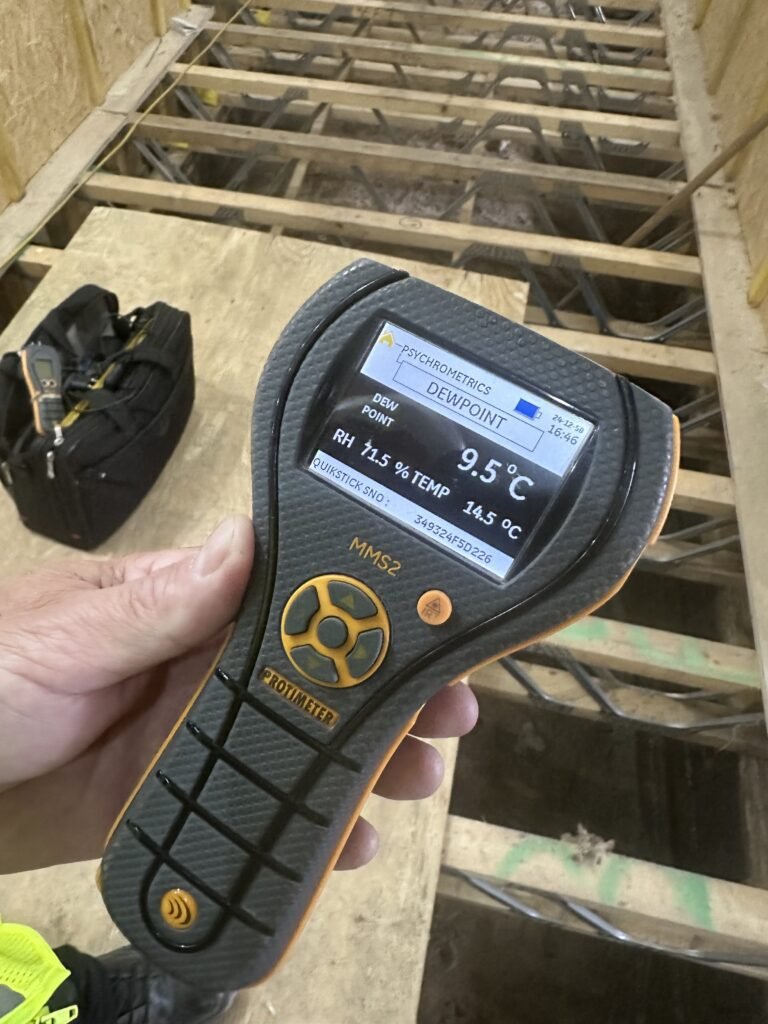What is damp proofing?
Damp proofing is a general term used to describe methods and treatments of controlling moisture that has built up within walls and floors in a property.
It is important to have qualified damp specialists tackle your damp problem, from the lack, failure or bridging of a damp proof course (DPC), to high levels of water ingress, and every other type of dampness in between (rising damp, penetrating damp and condensation).
Our damp proofing guide will provide all you need to know about damp problems and how to solve them.
If you require professional treatment, then our damp proofing specialists have been solving damp problems since 1990. Our experienced surveyors are fully trained and qualified to diagnose the exact cause of the problem and, if necessary, provide a treatment plan to remedy it.
What is a damp proof course?
A damp-proof course (DPC) is a damp proofing treatment used to control rising damp. Damp-proof courses can be installed with a few different methods, but the most popular and well known is the damp proof injection.
A damp-proof course is only effective against rising damp and will not help other damp problems such as condensation or penetrating damp, so we would always recommend contacting a qualified surveyor to develop a treatment plan before getting a damp-proof course installed. It should be noted that rising damp is regularly misdiagnosed by untrained tradespeople, so by discussing the problem with a qualified and trade body recognised company like RTC, you could potentially save yourself from any needless and ineffective treatment.
Why do you need a damp proof course?
Homes that do not have appropriate damp proofing measures installed are more likely to take on excess moisture. A functioning damp course is an essential part of any property in order to prevent moisture from the earth and soil rising up the walls through capillary action (also known as rising damp) and damaging the property as a result.
A missing, failed or bridged DPC will result in problems such as damp walls on both the internal and external walls in a property, and without treatment to correct this, rising damp problems can lead to additional problems such as timber decay.
Professional damp proofing
Damp problems vary in severity, and it is often the case that our qualified damp proofing surveyors can simply offer some advice and guidance that will allow you to combat the problem yourself without any additional treatment necessary. On the other hand, damp can also create a variety of problems like staining, plaster damage and could potentially cause serious property such as wood rot.
Contacting our damp proofing specialists means that you will understand the nature and severity of the problem and, if treatment is required, we can get started restoring your home back to its best. Give us a call to find out how we can help or book a damp proofing survey today by clicking the button below.
Do I need professional damp proofing?
If damp problems are left to develop and worsen, they can cause serious damage to your property. For this reason, we would always recommend that any damp proofing contractor you use is experienced and qualified for the job.
As the North-West’s leading property care specialists, our damp proofing specialists provide all the assurances and security you require to know that your property is in safe hands with us. When you choose RTC to work on your property, you will benefit from:
- Our 30+ years of experience providing damp proofing solutions in all types of properties
- Treatments backed by meaningful long term guarantees that others cannot match
- The peace of mind that comes from knowing our services have been approved by an extensive list of trade bodies
- Fully qualified surveyors and technicians that have comprehensive local knowledge and understanding of different building types in the area
Types of damp and damp treatments
Identifying the exact type of damp proofing you require can sometimes be difficult for those who are not professionally trained. Symptoms of conditions like penetrating damp, rising damp and condensation can look remarkably similar, but all require different damp proofing techniques to solve.
That said, when most people talk about ‘damp proofing’, they are usually referring to a remedial damp proof course. This is a type of waterproofing where a barrier is placed in a wall to prevent rising damp. There are many other types of damp proofing treatments available though and each is suitable for different types of damp.
Damp treatment process
From the initial damp survey, to completion of any damp treatment, our qualified surveyors and highly trained technicians will offer the following:
- Identification of the damp issue
- Determining and treating the source of the damp
- Full consultancy resulting in a bespoke treatment plan that takes into account your property’s needs and your budget
- Carry out any necessary internal and external repairs
- Removal and replacement of any damaged plaster and timber
- Help and advice for safeguarding and maintaining your property in future
- Leave your property in a clean, safe and habitable state at the end of our treatment
Our team will so keep you up to date throughout the damp treatment process, ensuring that you know how the job is progressing and what is being done to help your property. To find out more about different damp treatment methods to solve damp patches on walls caused by rising damp, penetrating damp and condensation, don’t hesitate to get in touch with us.
Signs that I need to damp proof my house
A common question that is asked is “how do I know if I need damp proofing carried out?”.
There are a number of signs that can provide an indication that you have a damp problem, such as:
- Plaster will start to deteriorate on the walls
- Tidemarks appear on the walls at low level
- Salts may appear on the surface of the walls
- The walls can feel cold and damp to the touch
If you spot any of these signs, we recommend that you contact a damp proofing specialist so they can provide an inspection to check what damp treatment will be needed to rectify the problem.
Damp proofing walls
Most people start to think about damp proofing when symptoms of damp start to appear on their internal walls. Damp on walls causes aesthetic damage to paint, plaster, wallpaper, skirting boards and other fixtures and fittings, however, it can also lead to more serious problems such as rot, which can affect structural timbers.
Other problems associated with damp walls include poor energy efficiency with higher bills, as a result. If you notice damp walls in your property, then we recommend acting fast to resolve the issue. Generally speaking, the sooner a damp wall is repaired, the less deterioration it will suffer.
What causes damp?
The cause of dampness varies depending on the type of problem in your home.
Condensation is the most common form of damp. It is caused by a build up of warm, moist air that settles on nearby walls and ceilings due to poor ventilation. Inadequate ventilation means that this air will condense and release its moisture onto these surfaces and, if left untreated, will lead to mould.
Other common causes of damp include moisture from below ground level or external walls finding its way inside the building. This is due to lack of damp proofing or cracks in the properties structure, allowing moisture to seep through.
The excess moisture that causes damp walls can come from various places, such as;
- Humidity caused by poor ventilation
- Faulty roofing, gutters and down pipes
- Bridged or damaged damp proof courses
- Damage to foundations from tree roots or invasive weeds
- Damp cavity wall insulation
How to identify signs of damp in your house?
The earlier you can identify signs of damp in your house, the easier it is to take action and prevent the problem developing further.
Damp can effect any building, new or old, but typically, it can be attributed to poor maintenance, poor build quality, the use of low-quality materials, or the absence or failure of an existing damp proof course.
If you feel that you would benefit from professional help, contact our damp specialists or book a survey using our form.
How to treat a damp basement or cellar
When it comes to damp proofing an underground space, it is common to see the process referred to as opposed to damp proofing. This is because basement waterproofing systems are often very different from the systems used to treat damp problems above the ground.
Tanking systems and waterproof membrane and drainage systems are common solutions for keeping a basement or cellar dry. These work by holding back or managing water ingress from earth retaining walls.
Cleaning after damp proofing work
Resolving damp problems is frequently a messy business. Often dust and debris is creates when holes need to be drilled into affected walls and plaster hacked and flaked off to gain access to the problem area.
This is why our damp proofing specialists are equipped with industry-leading Hilti dust extraction units to assist in the clean up process. these units can be used during any damp treatment procedure to reduce the amount of dust and hazardous particles in the air.



